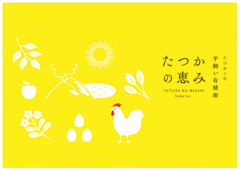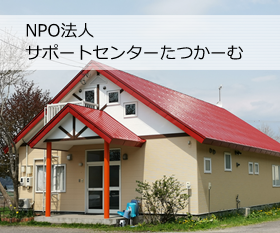Greetings from the farm owner
Living together as completely equal partners, sharing joys and sufferings, overcoming the line between those who guide and those who are guided; producing our own daily food, and creating a society where those who have handicaps or disadvantages and those who are not considered so can live together naturally. Based on such keen wishes our farm, TATUKAMU(pronounced as “ta-tsu-calm”) was founded in 1987.
In the beginning, my wife, myself, and three young men who had just graduated from a school for disabled students started to live together at an abandoned farm. Presently, some 20 staffs are working and producing more than 10 farm produce using 7 hectares of fields and Tadashi Tamotsu natural eggs of 4000 chickens raised and kept by the natural poultry through a farming method that allows organic circulation of the garden, livestock, and human beings. We have also worked on productions of organic fertilizer, microbial organic material, and food such as “miso”(bean paste), undertaking some contract works at local livestock farmers, and opening a small café with an outlet store.
We hope to contribute for healthier lives of people and preservation of natural environment through those works, but more than anything, we ourselves are enjoying safe and delicious food with gratitude.
A day at our farm starts from taking care of chickens living freely in our tetrahedral open chicken coops. Chickens wait for the delicious food that we make mixing local wheat, rice bran, microbial fermentation feed, and so on. One squeezes his way in the huddling chickens, feeding them. One collects fresh and still warm eggs from spawning boxes. One throws grass cut by a cutting machine into chicken coops. One washes water containers and carries water to the coops. Everyone works with pride and confidence for the work that is entrusted to him / her.
After the work with chickens, work in the field or those with processed goods are waiting for them.
Weeding doggedly, groveling on the vast field or harvesting crops makes one feel pure in the experience that he/ she is surrendering himself/ herself in nature. Such a feeling is often stronger than the heat of the summer or someone’s lower back pain.
Chicken coops of 1600 square meters and other work facilities were also built by us from digging holes for pillars to putting on tin roofs.
At the farm, counting from the works in the field and those with the animals, carpentry, food processing, snow shoveling, and other countless works are heaped up. Mastering each of them, and to become able to handle them independently becomes our confidence and joys of lives.
A life embedded in nature which allows no time for hesitation with such words as “Can we actually do it?” made us strong and independent.
At the decision to make the farm work our lifelong livelihood, we decided to produce only what we ourselves want to eat, which must be delicious and something we can offer to our children without worries.
That is why, our decision to aspire for organic farming was a natural consequence that we could think of no other way.
As a part of the organic cycle, we asked for the participation of chickens, and at an end of the cycle allowed ourselves to participate rather greedily.
The role that we play there is to combine all that are produced and created there – they can be crops, eggs and meat, droppings, anything that is left over, all kinds of human emotions, the relationships of people including our visitors and customers, etc – and to bring them into a higher cycle, and to broaden it at the same time.
Production of the fermented poultry manure fertilizer, food and livestock processing which transforms the surplus into products, culturing useful microorganisms who are the secret heroes in creating the cyclic connections, active acceptance of apprentices, contract works at local farmers, and selling the products directly to customers at the outlet store are all for the sake of creating a system which allows us to do this.
At the enforcement of Services and Supports for Persons with Disabilities Act in 1996, we chose decidedly to go along with the system in order to expand employment and to enhance welfare for the disabled in the local area.
We made the farm which had been a voluntary organization a form of a company that runs a multifunctional business with the Work Continued Support type A, and the Employment Transition Assistance. Also by the establishment of a NPO corporation, Support Center Tatukamu, we run a Care-home (a type of group homes) mainly for the members who had lived here in a less independent circumstance, and the Regional Activity Center “Nonno”( a day-care center for people with various kinds of physical or mental handicaps and disadvantages) that values artistic and hobby activities, and offer such services as counseling, home care, and help guide services. The company and the NPO corporation together function the way that allow us to be both economically and socially independent.
Since the establishment of the farm, we have made employment relationships equally with those who have disabilities or those who have not. Eliminating the idea of the ability based payment, we have been able to distribute each one a share that he/she needs, an amount that is more than the minimum wage level. According to the performance report of the average wages of the business entities that carry out the Work Continued Support type A in the year 2009, we are listed as the third highest in the Hokkaido prefecture.
In order to maintain this wage level, we have cultivated the market by ourselves, and have improved our production techniques in organic farming and animal husbandry in order to make our produce a brand. Supplementing the revenue of these are the grants in regard to the employment of persons with disabilities, and subsidies according to the Services and Supports for Persons with Disabilities Act. We share those incomes on an equal basis.
In the realm of work also, someone with a mental illness who can drive cars may drive a tractor or other agricultural machineries. One with physical disabilities may work at an office or become a coordinator in certain realms. In this way, we work supporting and supplementing one another.
Believing that our small symbiotic and independent life, as well as our small challenges will become a foundation for the society where each one can live together naturally, we will continue cultivating our fields and the locality.
Ritsuo Takano
April, 2010


